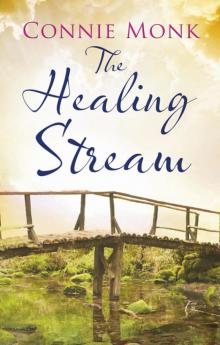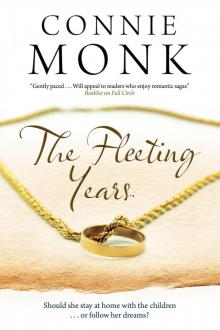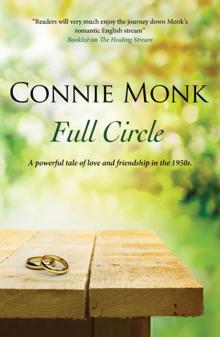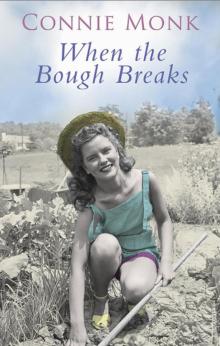- Home
- Connie Monk
The Healing Stream
The Healing Stream Read online
Table of Contents
Further Titles by Connie Monk
Title Page
Copyright
Chapter One
Chapter Two
Chapter Three
Chapter Four
Chapter Five
Chapter Six
Chapter Seven
Chapter Eight
Chapter Nine
Chapter Ten
Chapter Eleven
Epilogue
Further Titles by Connie Monk
SEASON OF CHANGE
FORTUNE’S DAUGHTER
JESSICA
HANNAH’S WHARF
RACHEL’S WAY
REACH FOR THE DREAM
TOMORROW’S MEMORIES
A FIELD OF BRIGHT LAUGHTER
FLAME OF COURAGE
THE APPLE ORCHARDS
BEYOND DOWNING WOOD
THE RUNNING TIDE
FAMILY REUNIONS
ON THE WINGS OF THE STORM
WATER’S EDGE
DIFFERENT LIVES
THE SANDS OF TIME
SOMETHING OLD, SOMETHING NEW
FROM THIS DAY FORWARD
ECHO OF TRUTH
MISTRESS OF MANNINGTOR
FAST FLOWS THE STREAM
THE LONG ROAD HOME
TO LIGHT A CANDLE
A SECOND SPRING
HUNTERS’ LODGE *
A PROMISE FULFILLED *
BEYOND THE SHORE *
WHEN THE BOUGH BREAKS *
THE HEALING STREAM *
*available from Severn House
THE HEALING STREAM
Connie Monk
This ebook is copyright material and must not be copied, reproduced, transferred, distributed, leased, licensed or publicly performed or used in any way except as specifically permitted in writing by the publishers, as allowed under the terms and conditions under which it was purchased or as strictly permitted by applicable copyright law. Any unauthorised distribution or use of this text may be a direct infringement of the author’s and publisher’s rights and those responsible may be liable in law accordingly.
First published in Great Britain and the USA 2012 by
SEVERN HOUSE PUBLISHERS LTD of
9–15 High Street, Sutton, Surrey, England, SM1 1DF.
This eBook edition first published in 2012 by Severn Digital an imprint of Severn House Publishers Limited
Copyright © 2012 by Connie Monk.
The right of Connie Monk to be identified as the author of this work has been asserted in accordance with the Copyright, Designs & Patents Act 1988.
British Library Cataloguing in Publication Data
Monk, Connie.
The healing stream.
I. Title
823.9´2-dc23
ISBN-13: 978-1-78010-309-9 (epub)
ISBN-13: 978-0-7278-8200-4 (cased)
ISBN-13: 978-1-84751-450-9 (trade paper)
Except where actual historical events and characters are being described for the storyline of this novel, all situations in this publication are fictitious and any resemblance to living persons is purely coincidental.
This ebook produced by
Palimpsest Book Production Limited,
Falkirk, Stirlingshire, Scotland.
One
July, 1955
Amelia Pilbeam had once said that when the time came for her funeral most of the pews would be empty. ‘At my age there are precious few friends still waiting their turn, and any there are can’t be up to an unexpected journey across to the island.’ Her granddaughter, Tessa, seemed to hear the familiar voice as she walked up the aisle to take her place in the front pew. Of one thing she was certain: all those she had telephoned to tell of Gran’s sudden death would be as close in spirit as were any from the village who, despite Amelia’s expectations, had donned black and made their way to the parish church. Did Gran know? Tessa felt that she did; she could almost hear the old lady’s mirthful chuckle and see her still-pretty face as they shared the knowledge – not as something sombre but as a secret joke.
All eyes were on Tessa as, looking straight ahead of her, she took her seat on the otherwise empty pew. Was it just her imagination or was the silence broken by a hiss of whispering? Well, let them think what they liked, she told herself silently. Gran would have hated me to wear black. ‘A lot of poppycock.’ That had been her view. ‘What’s the use of believing in a hereafter and then weeping and gnashing your teeth because someone’s got their ticket to go there? When my time comes, Tessa, you put on the prettiest you have. Rejoice! That’s what folk should do. Unless their grief is for themselves because they are frightened to look ahead without the one who had meant so much. Oh, but how I grieved when your darling mother was killed.’
The organ started to play, there were movements by the church door, then footsteps. Tessa clenched her fists, making sure that she still looked straight ahead and not letting herself turn to see the men carrying the coffin into the building. But these hurrying footsteps weren’t those of pall-bearers; it must be a latecomer.
‘Couldn’t get here sooner – just in time.’
She turned at the whispered words as a man took his seat at her side, then dropped to his knees for such a brief time he could have done no more than send up a quick apology for his late arrival.
‘I thought you couldn’t spare the time to come,’ she whispered back, her voice holding no welcome. ‘I thought the cows were more important.’
‘Naomi said she could manage until tomorrow. Didn’t like leaving her – but there are things I must attend to here. Hush – they’re coming in.’
Through the days following Amelia’s stroke Tessa’s anger towards her Uncle Richard had grown by the hour. What work could be more important than the knowledge that his mother was helpless, unable to speak, almost unable to move? In the moment of her collapse their futures had been changed – her own and Tessa’s too. And yet he had said his animals needed his constant attention! If he could be here now, when it was too late, why couldn’t he have come sooner? How must Gran have felt when she realized that he didn’t care enough to want to be with her? As the rector preceded the cortège up the aisle, the sound of his solemn voice breaking the silence, Tessa hung on to her resentment towards the man at her side; it helped her to bear the moment she had been dreading. Despite herself, her glance moved to the coffin less than six feet from where she sat. Gran was lying in there; Gran who had been her entire family almost as far back as she could remember. Don’t think about the future . . . don’t imagine coming home each evening to an empty house, no easy companionship that paid no heed to the generation gap . . . no one to share the excitement of watching their latest acquisition, a television set that brought distant happenings of the world so much closer . . . no one to share her interest in changing fashions, for Gran had never let herself become ‘old’, and yet neither had she tried to appear younger than she was, and she always delighted in seeing Tessa in up-to-the-moment styles now that clothes coupons were just a memory. It had been important to Amelia Pilbeam to look her best and surely there couldn’t be a woman in the village who hadn’t admired her; always smart, a weekly visit to the hairdresser making sure her standard didn’t fall, her face made up and yet never looking painted. Gran, I’m not going to cry; if I did it would just be that I’m sorry for myself. Rejoice, that’s what you said. That’s why I told Mr Brent these were the hymns we wanted him to play, all full of glory and triumph. Can you hear everyone singing? Uncle Richard got here in the end, but what’s the point of coming now? It’s just show. He should have been here when you needed him. You love him, I know you do, so I must try and be polite. But you and I, we both know it will only be surface politeness. She seemed to hear the familia
r chuckle. ‘Things to attend to,’ that’s what he said. What’s it got to do with him? I know he’s your son, but he’s never made an effort to come and see you. I told you, I’ll not be horrid to him because you wouldn’t want me to, but I feel sort of screwed up with anger at him. I know when I was away at school you used to go at least once each term to stay with him but since then he hasn’t made the effort even once. And I bet he’s so wrapped up in his own narrow little world that he hasn’t even realized how seldom he’s seen you.
So her thoughts rambled on with her bitter resentment towards the still good-looking man at her side helping her through the ordeal of the service. The pall-bearers were shouldering the coffin, and she felt Richard Pilbeam take hold of her elbow to guide her to walk with him and follow it as the choir started to sing the Nunc Dimittis. ‘Lord, now lettest thou thy servant depart in peace according to thy word . . .’
First the coffin, then the rector, then Richard and Tessa, followed at a respectful distance by people who had known, liked and admired Amelia.
‘You should have realized you only had to ask me.’ Richard spoke softly to Tessa, careful that neither the rector in front nor anyone following would overhear what he said. ‘I would have sent you a cheque to buy something suitable to wear. Surely that suit wasn’t the most sombre thing in your wardrobe?’
‘Oh, no.’ She heard the defiance in her tone and rejoiced in it. ‘I usually wear a dark grey one to work in the hotel. But Gran hates all that nonsense. Anyway, she and I went to Bournemouth for the day when the January sales were on and it was she who spied this. She said it suited me better than anything I had so I knew it was what she would want me to wear today.’
Richard grunted, the sound doing nothing to endear him to her. In truth he would hardly have been human if he hadn’t realized how attractive this niece of his had become. Recalling the skinny six-year-old he had seen at the memorial service for her parents who had been killed in a raid on London in December 1942, it was hard to believe she had turned into such a beauty. For that’s what she was. If she’d been six when his mother had become her guardian, according to his arithmetic that would mean she must be nineteen. In less than two years she would come of age. How different it might have been if he and Naomi had been made her guardians right from the beginning. She would have been the daughter they’d never had. One thing was certain: brought up at Chagleigh Farm she wouldn’t have kitted herself out like she had today. Not that she didn’t look attractive – damned pretty, in fact – with those clear eyes just the same dark brown as her hair. But it wasn’t right to come to her grandmother’s funeral in a red suit even if it flattered her, and as for those matching shoes, he’d never seen heels so high. And too much rubbish on her face, too; even her eyes were made up. No, if she’d been brought up at the farm she wouldn’t have filled her head with such nonsense. His mind jumped to Naomi, his precious, unchanging Naomi. Whatever she did, she did with all her abundant energy. Was there ever a woman like her? Running their home, working in the dairy, tending the chickens, helping clean the pigsties, tackling any task that came her way, his never failing constant companion and friend . . . friend? Friend and lover, too.
While his thoughts had been back at the farm with his wife, the coffin had been lowered into the ground. Mother dead . . . just a memory. Well, that she certainly would always be: a very dear memory. Never once had she suggested he neglected her when he couldn’t spare the time to visit her.
Not many people had come to the graveside, just the rector’s wife (who, although to look at her no one would have guessed it, was thinking who she might inveigle into buying and arranging the church flowers on the fourth Sunday of each month now that Amelia was gone), and Thomas Sedgley, Amelia’s solicitor ever since she had moved to the Isle of Wight some twenty-five years ago. Both of them were on the other side of the grave facing across the lowered coffin to where Richard stood with Tessa.
Tessa smiled in recognition at the ageing solicitor, remembering how kind he had been when she had gone to him with the news of her grandmother’s death. Unsure what she had to do she had called at his office for guidance and he hadn’t failed her.
Then it was over. Before moving off, the rector’s wife shook hands with Richard and kissed Tessa; the rector shook hands with both of them then hurried to join her. Only the solicitor waited.
‘Thomas Sedgley.’ He introduced himself, holding out his hand to Richard. ‘You must be Mrs Pilbeam’s son. I’m glad you were able to get here.’ Then, with what Tessa saw as extra warmth in the smile, he turned on her. ‘Hello, my dear. I see you managed all the arrangements very well. So many people there to say goodbye to a dear friend.’
‘Do you have a car with you or can I give you a lift to the house?’ Richard asked.
‘If you would be so kind. My office is only just along the road, so I walked.’
‘To the house?’ The invitation had cut through Tessa’s armour of reserve. ‘You mean people will be coming back to Gran’s – for tea or something? I hadn’t thought . . .’
‘No, my dear, my visit is something different.’ Thomas laid a restraining hand on her arm as he told Richard. ‘As I arranged with you, I have the papers with me.’
‘Then we’ll all drive back together. I’m glad we can go over the will today; I want to catch the mid-morning ferry tomorrow. I can’t be away any longer.’
Ignoring what he’d said, Tessa told him, ‘You follow behind then; I’ve got Gran’s car.’ And with that she left them and, with her head consciously high, crossed the road to Middle Lane where she had parked. She had never been gladder of her ability to handle the car.
‘God knows how she walks in those ridiculous shoes, let alone drives in them,’ Richard muttered more to himself than to Thomas Sedgley.
‘A remarkable young lady. She and your mother were very close, I believe.’
‘You don’t know whether she had been made aware of the arrangements Mother wished for her? I haven’t had an opportunity yet to talk to her myself.’ Then, with a sudden and unexpected smile, ‘She’s got it in for me right enough. Can’t you just feel the way she bristles?’
‘Not on account of the future arrangements, I fear, for until I give her the letter that Mrs Pilbeam left in my keeping some years ago I am sure she is in ignorance of any such idea.’
‘I wish Mother had told her. Face-to-face it might have been easier for her. Most of Mother’s visits to the farm were during term time while the child was away at school and, since then, she always came on her own while Tessa holidayed with old school friends. I dare say you know the girl much better than I do. Despite being nineteen years old, and despite the way she has dealt with the arrangements for today, she strikes me as being unworldly – like a child dressed in grown-up clothes. Damn it, girls a year or more younger than she is were in uniform and serving their country not so long ago.’
‘Her life has been sheltered, Mr Pilbeam. It used to worry your mother that having spent so many years in boarding school on the mainland the child had no friends of her own age on the island. I understand she has friends from her school days but no one for day-to-day companionship. I have a granddaughter a few years her junior, living here on the Isle of Wight. She and her friends have their heads filled with adolescent rubbish, film stars, tap dancing, and beastly noisy records for their gramophones, unimaginable nonsense. I know it worried Amelia that Tessa missed out on all that sort of fun once she came home from school.’
Richard opened the passenger door for the solicitor, who apparently had been on closer terms with his mother than he had realized. Just at that moment Tessa drove past them without a glance.
Putting on his half-moon glasses Thomas took the parchment will from its envelope and spread it on the table before him, cleared his throat and started to read.
‘This is the last will and testament . . .’
A sum of two hundred pounds was to go to Violet Dinsdale, a local woman who had worked in the house daily as long a
s Amelia had lived there. Everything was to be disposed of, debts settled and an amount of four pounds for each month until Tessa reached the age of twenty-one to be paid to Richard, who was Amelia’s executor. The residual estate was to be equally divided between Richard and Tessa.
Taking Tessa by surprise, she was suddenly filled with a feeling of hope, of promise. Life was suddenly there for her to grasp. Things would be new and different. She could see no real shape but, despite that, she could make her own decisions, choose her own path. And all because Gran was making it possible. With the rush of excitement came another emotion: guilt that she could look to the future with hope when darling Gran was gone. But of all people she would be the one to understand, for she had had such joy in living. The thought of having the extra four pounds Richard would send her a month as well as what she earned working at the hotel made her imagine herself wealthy. She knew nothing of legal affairs but it seemed unnecessarily complicated that her four pounds should be paid to her uncle instead of straight to her, but that must be because he was the executor. Gran might have imagined that if she had it a year at a time she would go on a spending spree – spending sprees had always been such fun for the two of them together. Pulling her thoughts back into line she saw that Mr Sedgley was passing her an envelope with her name on it written in handwriting she knew so well.
‘Gran wrote it for me?’ Eagerly she took it, feeling the elderly lady’s presence very close. As she tore open the envelope she didn’t even notice that the two men were both watching for her reaction.
‘My darling Tessa,’ she read, ‘I hope this letter will never be given to you. I hope I will be there to celebrate your twenty-first birthday. But we none of us know when the call will come and if I get mine and leave you before then, I am handing care of you to Richard and Naomi. Oh dear, I can just picture your face when you read this but if it’s on the cards that I come to the end of the track while you’re underage at least I shall hit the buffers in peace knowing that you will be in good and loving hands. You hardly know them, and that’s been my fault: I ought to have seen to it that we visited the farm together, but when we had a chance to have a jaunt somehow we always found such “fun things” to do. So read this – no, don’t frown, just trust me, dear Tessa – and make yourself accept with a smile. That way, life is so much easier. Richard and Naomi have a home full of love; it will be impossible for you not to be happy living with them in Devon. Although we are all so far apart I honestly love them deeply, as I am sure you will too once your ruffled feathers are smoothed down. It’s what I truly want for you. Make yourself smile and accept even if you are angry and fearful – and that way, even though your life will be very different from the one we have here, you will find happiness and give happiness to them, too, just as you always have to me.

 The Healing Stream
The Healing Stream The Fleeting Years
The Fleeting Years Full Circle
Full Circle When the Bough Breaks
When the Bough Breaks